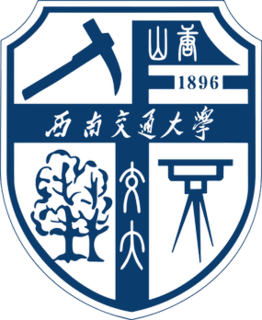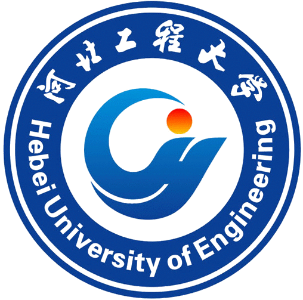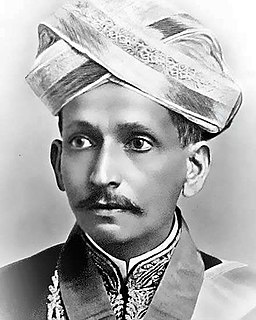
Civil engineering is a professional engineering discipline that deals with the design, construction, and maintenance of the physical and naturally built environment, including public works such as roads, bridges, canals, dams, airports, sewage systems, pipelines, structural components of buildings, and railways.

Hebei or, is a northern province of China. With a population of over 74 million people, Hebei is China's sixth most populous province. Its capital and largest city is Shijiazhuang. The province is 96% Han Chinese, 3% Manchu, 0.8% Hui and 0.3% Mongol. Three Mandarin dialects are spoken in Hebei: Jilu Mandarin, Beijing Mandarin and Jin.
ITS, its or it's may refer to:

Indian Institute of Technology Roorkee is a technical university located in Roorkee, Uttarakhand, India.
Jiaotong University, Jiao Tong University or Chiao Tung University may refer to:
- Shanghai Jiao Tong University, Shanghai, People's Republic of China
- Xi'an Jiaotong University, Xi'an, Shaanxi, People's Republic of China
- Southwest Jiaotong University, Chengdu, Sichuan, People's Republic of China
- Beijing Jiaotong University, Beijing, People's Republic of China
- National Chiao Tung University, Hsinchu, Taiwan

The Hebei University of Technology is a provincial public university in Tianjin, China. HEBUT is sponsored by Hebei Provincial People's Government, Tianjin Municipal People's Government and the Ministry of Education of China, which specializes in engineering studies and combines multiple academic areas including technology, science, economics, management and arts. HEBUT is first engineering-based university to launch MBA program in China, and only university in Tianjin province that offers EMBA.

Hebei University of Architecture, formerly Hebei Institute of Architecture and Civil Engineering, is a university in Zhangjiakou Hebei, China under the provincial government.
North China University of Science and Technology is a university in Tangshan City, Hebei Province, People's Republic of China. North China University of Science and Technology is one of the ten key universities of Hebei Province, China. It is a comprehensive university taking engineering and medicine as the backbone and pursuing a harmonious development of engineering, medicine, sciences, economics, management, law and humanities. Education programs are provided for masters, bachelors, international students and adult students.

B.S. Abdur Rahman Crescent Institute of Science and Technology, formerly B. S. Abdur Rahman University, is a private university located in Tamil Nadu, India. Previously, functioning under University of Madras (1984–2001) and Anna University (2001–09) as Crescent Engineering College, the institute gained deemed status in 2008–09. It is located in Vandalur near Tambaram and opposite to Arignar Anna Zoological Park, a suburban area of Chennai, India.

Southwest Jiaotong University is located in national central city Chengdu, Sichuan Province, affiliated to the Ministry of Education of the People's Republic of China. It's a national key university co-supported by the Ministry of Education of China, China Railway Corporation, Sichuan Provincial Government and Chengdu City.

The National Academy of Indian Railways (NAIR), Vadodara formerly Railway Staff College and historically the Pratap Vilas Palace, is a Centralised civil service, engineering and medical training institute for Civil Service, Engineering and Medical Officers of Indian Railway Personnel Service, Indian Railway Stores Service and Indian Railway Medical Services cadre headed by a Director General and manned by an faculty of experienced Railway Managers and Experts. Starting with the initial training of Officers Trainees inducted as Central Civil Services, Engineering and Medical professionals that form the backbone of Indian Railways, the Academy also conducts, mid-service mandatory or theme based in service Management Courses for all Officers of IR and courses for Officers of other Group A Central Services, Public Sector and Foreign Railways. The Academy is housed in the sprawling 55 acres campus of the Pratap Vilas Palace at Lalbaug, Vadodara.
The Indian Railways Institute of Signal Engineering and Telecommunication, Secunderabad is an Institute based on Signal Engineering and Telecommunications. Located in Secunderabad, this institute is run by the Ministry of Railways (India), Indian Railways in 1957 as a subsidiary of Indian Railways.
The Indian Railways Institute of Electrical Engineering (IRIEEN), Nashik, was set up by Indian Railways at Nashik in Maharashtra for imparting training to newly appointed officers of the Indian Railway Service of Electrical Engineers, recruited through an Engineering Services Examination conducted by the Union Public Service Commission, New Delhi. The institute was set up in 1988 at Nashik, Maharashtra. The institute is headed by the director. He is assisted by a team of nine faculty members who have practical experience as well as technical qualifications.
The Centralised Training Institutes of the Indian Railways has eight constituent institutes. The Indian Railways is the largest civilian employer in the world at approximately 1.6 million employees. Around 12000 officers form the line and staff management. Training of all the management cadres is entrusted and shared between these eight institutes.
Indian Railways Institute of Civil Engineering (IRICEN), Pune is the training institute for the Civil engineers of the Indian Railways. The institute had a modest start in 1959 as the Permanent Way Training School for training entry level Civil engineers. It is now a Centralised Training Institute and trains officers of the IRSE cadre of the Indian Railways.

Hebei University of Engineering is a provincial university based in Handan, Hebei, China.

Sir Mokshagundam Visvesvaraya, often referred by his initials, MV, was the first Indian civil engineer, statesman, and the 19th Diwan of Mysore.
Shijiazhuang Tiedao University, is a national key university in China, specialised in transportation science, engineering and technology and information technology, etc. STDU is currently under the joint administration of the People's Government of Hebei Province, the Ministry of Education of the People's Republic of China, State Administration of Science, Technology and Industry for National Defence of the People's Republic of China and National Railway Administration of the People's Republic of China. It has been selected, with Tsinghua University, Zhejiang University, Shanghai Jiaotong University, Beijing Jiaotong University, Beijing Institute of Technology and other key universities, for the "Educating and Training Program for Outstanding Engineers" (教育部"卓越工程师教育培养计划") of the Ministry of Education. In 2016, STDU was listed as the key supporting first-class universities and first-class-discipline construction university.
Articles 315 to 323 in Part XIV of the Constitution of India provides for the establishment of Public Service Commission for the Union of India and a Public Service Commission for each State. The same set of Articles of the Constitution also deal with the composition, appointment and removal of members, power and functions and independence of a Public Service Commission. Union Public Service Commission (UPSC) to conduct examinations for recruitment to the "All India Services" (AIS) and the "Higher Central Services" (HCS) and to advise the President on disciplinary matters. State Public Service Commission in every state to conduct examinations for recruitment to state services and to advise the governor on disciplinary matters.









